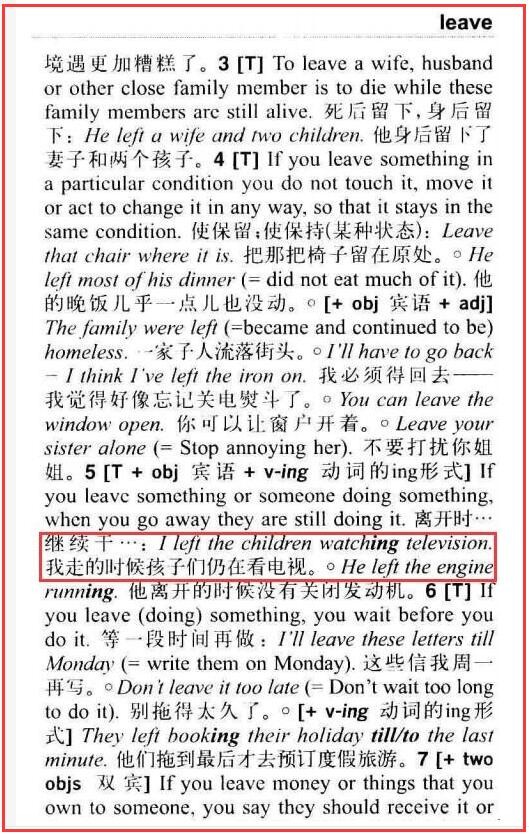很有意思的问题,前面几位老师已经说的比较多了,leave sb doing sth的解释到底是If you leave someone doing something, they are doing that thing when you go away from them(柯林斯第九版的解释)还是to make or allow somebody/something to remain in a particular condition, place, etc(牛津第九版的解释).即是有“使役”还是没有“使役”的意味?
我觉得也许两者兼有,在不同的语境下可能都存在,很细微,有时候还不矛盾,只是与语境有关。
柯林斯英语词典第一版leave词条下:
If you leave someone doing something or leave them to an activity, you allow them to carry on with what they are doing when you go away from them.
例句是:
1.We left him snoring in the front room.
2.He left them making their calculations.
很明显有使役的意味。
但在第就九版中却是这样写的:
If you leave someone doing something, they are doing that thing when you go away from them.
例句是:Salter drove off, leaving Callendar surveying the scene.
解释中看不太明显有使役的意味。貌似可以属于下文的第二个解释。
所以我斗胆作如下的分类解释:
1. If you leave someone doing something, they are doing that thing when you go away from them.
Salter drove off, leaving Callendar surveying the scene.
这句也可以作下面的第二个解释,看语境定。
2.to let sth/sb remain in a particular state, position, or condition
I’ll just leave the engine running while I go in.
Don’t leave tools lying about.
Leave the pots to soak overnight.
Don’t leave the engine ticking over while you are in the shop.
上面这几句因为是leave sth接的是物,所以属于第二类。 “我离开的时候引擎还在转”和“我离开后让引擎继续转”这两个意思有些细微的区别,“我离开后让引擎继续转”这个事件一个观察者可以用“我离开的时候引擎还在转”这个事实来描述,但是不够准确。I’ll just leave the engine running while I go in.这句因为有个while I go in就更清楚了。所以leave sth doing这个用法争议不大。
Don't leave her waiting outside in the rain.
Never leave children playing near water unattended.
Don't leave her waiting outside in the rain.
这三句因为是祈使句所以带有明显的使役意味。
那接下来这些句子到底是第一类还是第二类?
She left me waiting in the rain.
He’d left the tap running.
We left the children thrashing about happily in the shallow end of the pool.
I left the children happily splashing about in their tub.
都有可能。看具体情况。
最后说说第三类:
3.if an event leaves someone or something in a particular condition, they are in that condition because of it:
The incident left her feeling confused and hurt.
The announcement has left share-holders nursing huge losses.
Her narrow escape left her feeling shaken.
这一类因为是物作主语,比较好区分。
补充一下leave sb to do sth:
If you leave someone to do something, you go away from them so that they do it on their own.
I'll leave you to your crossword puzzle.
I'll leave you to get on with your book.
We went to Spain and left the children to fend for themselves.
The teacher provided some different materials and left the children to experiment.
She went out and left the children to be minded by their aunt.
I'll leave him to find that out for himself.
The men beat him and ran away, leaving him for dead/leaving him to die.









